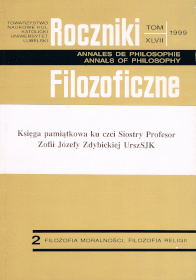The Logical Relations among Moral Evaluations of our Actions
Abstract
Many moral (and juridical) systems are based on three evaluations of human behaviours: obligatory, forbidden, indifferent. The logical relationship between them can be illustrated using deontological hexagon. It is clear that supererogatory action is not adequately reflected in the three-dimensional framework. R. M. Chisholm (building on some ideas A. Meinong’s) developed a five-dimensional evaluative framework for the analysis of the human morality. He classifies actions as „obligatory”, „forbidden”, „indifferent”, „supererogatory”, „offensive”. However, that conceptual system is not totally consistent since „non-offensive” cannot be identified with the disjunction of „obligatory”, „forbidden”, „indifferent”, „supererogatory”.
A complete and logical consistent systematization of our moral evaluations of actions can be obtained if we differentiate between coercive prescriptions (praecepta) and non-coercive advises (consilia). One must further differentiate between positive and negative prescriptions on the one hand, and on the other between positive advises („exhortations”) and negative advises („dehortations”). In this way we have four evaluations of actions: „obligatory”, „forbidden”, „exhorted”, „dehorted”. Adding to these concepts „indifferent” and after that – their negations, we obtain ten evaluative concepts. The logical relations among them cam be illustrated with deontological decagon.
Copyright (c) 1999 Roczniki Filozoficzne

This work is licensed under a Creative Commons Attribution-NonCommercial-NoDerivatives 4.0 International License.





